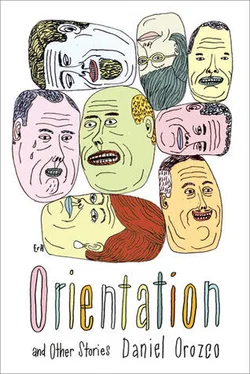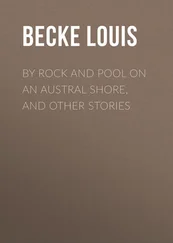He had somehow ended up with her in a corner of her crowded kitchen. They were seated across from each other at a tiny breakfast table, and she was telling him about a trip she was planning over Christmas, a trek along the Inca Trail in Peru. He was asking her questions to keep the talk going, and she was answering them, when a man detached himself from a nearby clique, smiled briskly at Bennett, and leaned against the wall behind her, holding a beer bottle in his hands. Bennett recognized him. He was a popular barista at an espresso bar at the medical center. He was young, narrow and pale, with lank black hair that flopped into his eyes. He wore one of those expensive secondhand bowling shirts that you find in expensive secondhand clothing shops.
“I heard it’s not so dangerous down there anymore,” Bennett was saying to her. “Not like it used to be, I mean.”
She shrugged. “It’s dangerous everywhere.”
“I suppose.”
“It could be dangerous right here.” She leaned forward, toward Bennett. “You never know where danger lurks.”
He looked at her and smiled. When Bennett was confused, he smiled. Her eyes glimmered. She smiled back. She was playing with him.
“I could be in danger right now,” she said. The barista behind her was grinning, picking at the label on his beer bottle, and Bennett realized that he was the one she was playing with. Two women appeared and tugged her out of her chair and swept her away. The barista looked at Bennett, toasted him, and tipped his beer back. Bennett watched the cartilage in the barista’s neck bob up and down. Then he got up and left.
He slammed the cage door shut and stabbed at the buttons. He would not be her go-between. He was no flirting conduit. “Fuck her,” he said. He liked hearing the words. “Fuck that shit,” he said, alone in the elevator that ticked like an old clock as it carried him down. He stepped outside into a cold autumn night. He couldn’t quite remember where his car was. He had drunk several beers really fast, and he was still buzzed. He guessed uphill, so up he went, chanting “Fuck her” in cadence to his steps. He could see his breath in the air before him. Maybe it was the brisk night air, the bracing uphill trudge. Maybe it was the cathartic power of the F-word, spoken aloud, over and over. But soon he wasn’t angry anymore, only embarrassed. He’d probably had six conversations with her in the past year, mostly work-related, and from them he had constructed the framework of a relationship and conjured the hope of something more. But between his conversations with her she had a life all her own and, before them, an entire history he was not a part of. You can’t know anybody, not really, not in the brief overlaps of flimsy acquaintance, nor in any of the tenuous and fleeting opportunities for connection that we are afforded. It was a bleak little moment of clarity, but it was for Bennett a certainty he could find comfort in. He felt better, tramping the streets of the city he was born in, pondering opportunity and connection, gauging his prospects — the next disappointment, perhaps. Or maybe not. And suddenly he remembered where his car was parked — clarity begets clarity! — when a voice very close behind him asked: “Fuck who?”
Bennett turned around, and two men were on him, shoving him swiftly backward and crowding him into a gap of hedge and against the wall of a brick building.
“Wallet. Money. Now.”
He looked at the one who spoke, a tall young man in a dark hooded sweatshirt, holding tight fistfuls of Bennett’s jacket and pushing hard against Bennett’s chest. He looked at the other man, who was shorter, and older. He wore a sport coat and slacks, and he was pressing a pistol into Bennett’s belly. Bennett had never had a gun pointed at him before. He thought it would be bigger.
“So are you deaf or what?”
He looked back up at the man who’d said this, the younger one, the one without the gun. Shouldn’t the one with the gun do the talking? Bennett was not deaf, but he wasn’t sure which one to tell this to. He looked from one man to the other and back. The face of the younger one was an inch away from his. His breath was sweet, cloying and thick, like rotted candy. Bennett felt sick. He couldn’t breathe.
“What are you going to do?” he gasped. “Shoot me?”
It was his most immediate concern, and a legitimate question, although maybe not the one you ask out loud. It was the wrong thing to say. Bennett was a little drunk, and suddenly very afraid, but also confused. So he smiled.
It was the wrong thing to do. The younger man loosened his grip. “Shoot him,” he said.
* * *
So Costas shot him.
They were driving to Astoria, Costas and the kid, to get ahold of some methamphetamine. They had dipped into their buy money, splurging on rib eyes and dirty martinis at a Black Angus in Bellingham, and they needed to make that up. They pulled off the I-5 in Seattle, parked the car, and walked up this hill until a man came out of a building, and they followed him.
Every four weeks or so they made a run to Pasco or Yakima, or as far south as Ashland if they had to. But Astoria was their favorite. Yakima was touch and go these days. The town had gone all fancy and upscale with the winery boom. There were too many strangers, and the supply was not always steady. And Pasco was just a fucking chore. The Mexicans they dealt with were quarrelsome and ill-tempered. They enjoyed needling the kid— maricón this, maricón that — and got a kick out of it when he invariably flared up and Costas had to settle him down. But Astoria was steady and mellow. The connection in Astoria was tranquilo. They always looked forward to that run. Costas drove, and the kid would stuff the CD changer with Led Zeppelin, slapping John Bonham’s drum work on the dashboard and screaming the lyrics out the open window into the rushing night. They pulled into rest stops, where they would do more lines, and the kid would go down on Costas, who hung on, knuckling handfuls of hair, bucking and groaning, and astonished still at the good fortune of this boy in his life.
They had met six months earlier when Costas went down to the carport one night and climbed into his car and started it up. He turned to back out and looked into the rear seat and saw this boy sleeping hard, dead to the world. It was a cold, damp spring, the usual in Bellingham, and Costas brought him inside and made him pancakes, and one thing led to another, and the boy stayed. Would it last another six months? Would it last through Christmas? What lasts, anyway? But it would do for now because that’s what matters, after all — the Right Now. Money in your pocket and cocaine’s rush and buzz, and this beautiful boy’s head in your lap.
Astoria was their hideaway, their love nest, whatever you want to call it. They would stay an extra night or two at a Red Lion down along the river, where every room had a balcony with a view of the marina and the Astoria Bridge, a very narrow two-lane steel structure that shot high over the Columbia to the Washington side. In the evenings, when mist whirled and settled onto the water in the distance, the bridge seemed in its trajectory to fall short of the opposite bank and plunge into the river, a bridge to nowhere.
Some nights they drove across into Washington, to a seafood restaurant in Chinook. It had once been an Episcopal church, and the nave was now the dining room, overlooked at one end by a stained-glass window of wooden ships on a storm-tossed sea. They ordered cioppino, and it came in a huge bowl with clams and mussels and crab parts sticking out. They put on bibs and used tiny tools to get at the meat and sopped up the broth with crusty bread. They lit up cigars and took a late-night stroll to walk off their meal. It was a small, narrow town, maybe five blocks wide, and made up mostly of vacation homes strung along a riverfront highway. Costas was a dog lover, and he kept kibble in his coat pockets to toss to the pooches that ran along the fences they walked by. Sometimes they set their lit cigars on the curb and stepped between the darkened houses, moving through open garages, peeking into the glove boxes of unlocked cars. Back doors were invariably unlocked, and they went inside just to see how easy it would be here, listening to the folks asleep in their rooms somewhere, and pocketing an insignificant trinket or two — a magnet off the refrigerator or a TV remote control — with only the dog of the house sniffing solemnly at Costas’s pockets for more treats.
Читать дальше












